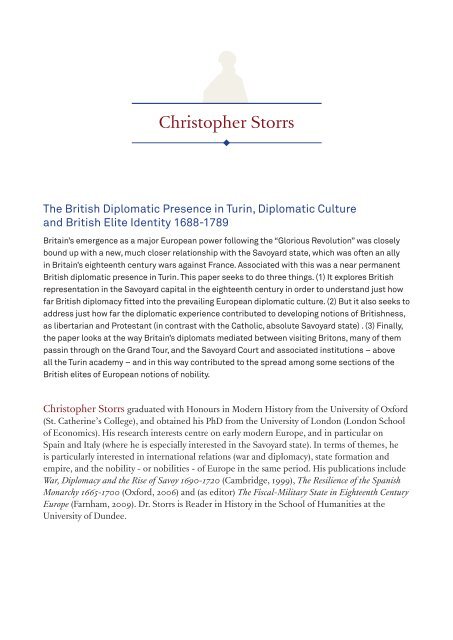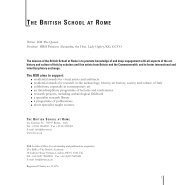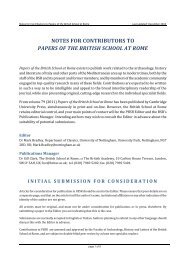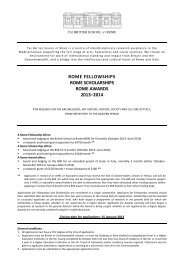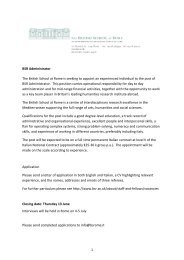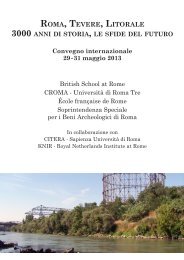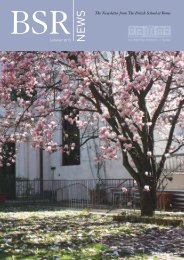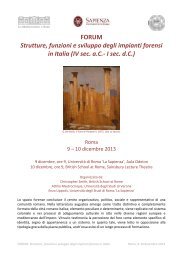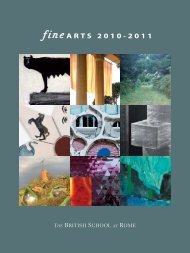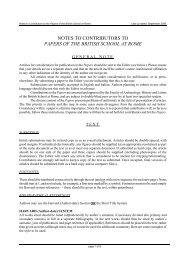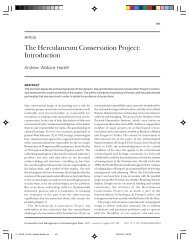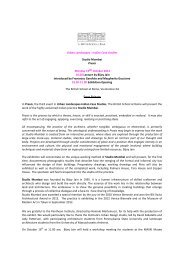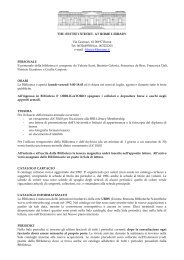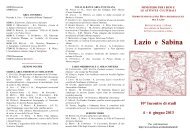Torino britannica. - The British School at Rome
Torino britannica. - The British School at Rome
Torino britannica. - The British School at Rome
You also want an ePaper? Increase the reach of your titles
YUMPU automatically turns print PDFs into web optimized ePapers that Google loves.
Christopher Storrs<br />
<strong>The</strong> <strong>British</strong> Diplom<strong>at</strong>ic Presence in Turin, Diplom<strong>at</strong>ic Culture<br />
and <strong>British</strong> Elite Identity 1688-1789<br />
Britain’s emergence as a major European power following the “Glorious Revolution” was closely<br />
bound up with a new, much closer rel<strong>at</strong>ionship with the Savoyard st<strong>at</strong>e, which was often an ally<br />
in Britain’s eighteenth century wars against France. Associ<strong>at</strong>ed with this was a near permanent<br />
<strong>British</strong> diplom<strong>at</strong>ic presence in Turin. This paper seeks to do three things. (1) It explores <strong>British</strong><br />
represent<strong>at</strong>ion in the Savoyard capital in the eighteenth century in order to understand just how<br />
far <strong>British</strong> diplomacy fitted into the prevailing European diplom<strong>at</strong>ic culture. (2) But it also seeks to<br />
address just how far the diplom<strong>at</strong>ic experience contributed to developing notions of <strong>British</strong>ness,<br />
as libertarian and Protestant (in contrast with the C<strong>at</strong>holic, absolute Savoyard st<strong>at</strong>e) . (3) Finally,<br />
the paper looks <strong>at</strong> the way Britain’s diplom<strong>at</strong>s medi<strong>at</strong>ed between visiting Britons, many of them<br />
passin through on the Grand Tour, and the Savoyard Court and associ<strong>at</strong>ed institutions – above<br />
all the Turin academy – and in this way contributed to the spread among some sections of the<br />
<strong>British</strong> elites of European notions of nobility.<br />
Christopher Storrs gradu<strong>at</strong>ed with Honours in Modern History from the University of Oxford<br />
(St. C<strong>at</strong>herine’s College), and obtained his PhD from the University of London (London <strong>School</strong><br />
of Economics). His research interests centre on early modern Europe, and in particular on<br />
Spain and Italy (where he is especially interested in the Savoyard st<strong>at</strong>e). In terms of themes, he<br />
is particularly interested in intern<strong>at</strong>ional rel<strong>at</strong>ions (war and diplomacy), st<strong>at</strong>e form<strong>at</strong>ion and<br />
empire, and the nobility - or nobilities - of Europe in the same period. His public<strong>at</strong>ions include<br />
War, Diplomacy and the Rise of Savoy 1690-1720 (Cambridge, 1999), <strong>The</strong> Resilience of the Spanish<br />
Monarchy 1665-1700 (Oxford, 2006) and (as editor) <strong>The</strong> Fiscal-Military St<strong>at</strong>e in Eighteenth Century<br />
Europe (Farnham, 2009). Dr. Storrs is Reader in History in the <strong>School</strong> of Humanities <strong>at</strong> the<br />
University of Dundee.


